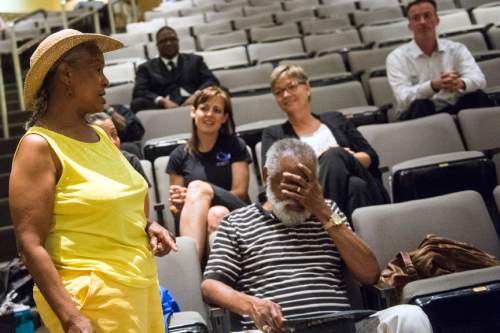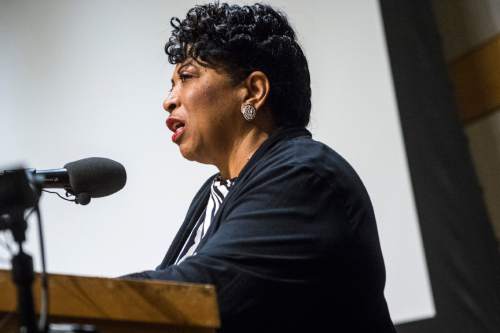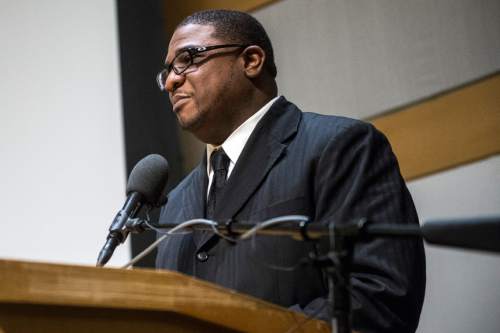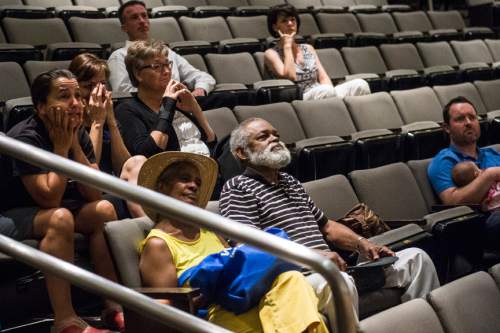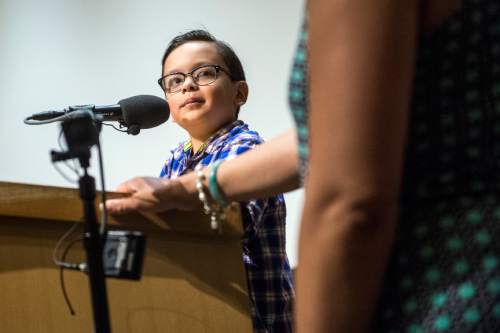This is an archived article that was published on sltrib.com in 2015, and information in the article may be outdated. It is provided only for personal research purposes and may not be reprinted.
The Rev. Corey Hodges was leading a Bible study Wednesday night at his multi-ethnic New Pilgrim Baptist Church in Kearns — a midweek tradition followed by thousands of other Christians all across the country.
After arriving home late that night, Hodges was stunned to learn that a white shooter had murdered nine such worshippers at the Emanuel African Methodist Episcopal Church in Charleston, South Carolina.
"I was in disbelief," Hodges said Saturday at a hastily organized NAACP memorial for the victims held at Salt Lake City's downtown public library auditorium, "that, after so much progress [on racial issues], that this could still be happening in this country. How can such a young man be filled with so much hate and disregard for humanity based on the color of their skin?"
Americans are not living in a "post-racial society, no matter how much we think we are," Hodges concluded. "My prayer is that our country will grow into a more perfect union … that we can love justice and not just talk about it."
The memorial was organized by Jeanetta Williams, president of the NAACP Salt Lake branch and State Conference of Idaho-Nevada-Utah office, who began the ad hoc service by solemnly and slowly reading out the names of the victims.
About two dozen participants from various organizations including the ACLU, the Inclusion Center, and Trinity A.M.E., Utah's oldest black church, were on hand to ponder, pray and remember.
Lucinda Sampson of Trinity, in a straw hat and matching yellow blouse and pants, urged her listeners to "throw down our weapons and make a circle of love."
Williams then invited audience members to share their thoughts, and several spoke of this horrific action as a kind of call-to-arms.
One man, who identified himself simply as Carl, said he had stepped away from the activism for a while, but this had "awakened" him to the need to "get back in the fight."
Abby Dizon-Maughan, who chairs the NAACP's criminal justice committee, was encouraged by the attendance of those who took time out of busy schedules to honor the deceased. She brought her 8½-year-old son, Noah, with her to the memorial, and to the podium.
"When I thought about the shootings, I thought that person was so full of hatred and that was bad," Noah said powerfully into the microphone, "And he didn't take time to think about the devastation he would cause … because he didn't love."
Take time to think "because all lives matter," the young activist said to loud applause. "Spread the love. If we don't, things are going to happen — like that shooting."
At the end of the memorial, Williams mentioned that the victims' families had offered their forgiveness to the perpetrator. For her part, though, it might be too soon.
"I am not ready to forgive him," the longtime NAACP leader said. "I've still got some work to do."


